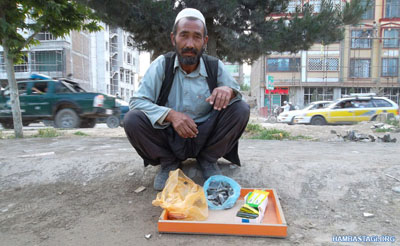By Mohammad Reza Gulkohi
Afghan voters put their faith in democracy and voted twice in two months for a president. But there is growing unease about the commitment of their leaders to a peaceful transition of power.
For six months everything has been on hold including the economy. People say the long-running presidential election has become like a TV serial they are getting tired of watching.
The frustration is tangible. Farzana whose husband is a daily wage worker says with the economy in limbo her husband is jobless most of the week. “There is less and less work while the country waits for the election results,” she says. “I have had to find work in people’s houses – as a cleaner or washing clothes in return for a little food. Even this sort of work is not easily available. There are so many people like us,” she adds.
Farzana blames the impasse on “leaders who think only of winning and their political position”. “No one is thinking about the people. If they were … they should show some mercy for us (people who are suffering because of growing economic hardship),” she believes. She calls it a “pity” that she bothered to vote. “I cast my vote to ensure a bright future for my four children,” she adds in frustration.
People’s pleas
Another equally emotional caller said, “Politicians instead of supporting the wishes of people are trying to safeguard power while people are being squeezed by the crisis of joblessness and insecurity…”
Many listeners called Radio Killid during a special morning programme, Killid-e-Sobh, to share their growing desperation. A caller, who appeared to be crying, said, “We don’t have bread to eat but the politicians are bargaining and robbing us of our businesses.”
Another equally emotional caller said, “Politicians instead of supporting the wishes of people are trying to safeguard power while people are being squeezed by the crisis of joblessness and insecurity…”
There is no one who does not have a complaint about the current situation. Most blame the candidates – Abdullah Abdullah and Ashraf Ghani – for stopping the recounting of votes as well as not compromising for the sake of ordinary Afghans.
Government officials admit the logjam has hurt the economy.
Ministry of Finance spokesperson Abdul Qader Jailani said there has been a policy paralysis since the start of the election process. Projects have been delayed or on hold. Imports to the country have fallen by eight percent. Investments have slowed further since the election went into a second round.
At the graduating ceremony of the Afghan-Korea Training Centre Mir Jalaludin Hesham, the adviser to the Ministry of Labour, spoke plainly. “The lengthy process of elections has put all crafts in a state of dormancy.” Most industries – big and small – have seen business shrink; applicants are not finding jobs, he also said.
The 2014 Afghanistan presidential election may well go down in history as the world’s longest election.
Pliable, and not independent
Independent experts and civil society activists blame the situation on the lack of independence shown by the election commissions, which surrendered to the wishes of candidates. They called for the speeding up of the process of auditing of every vote cast in the runoff. The rival candidates, Abdullah Abdullah and Ashraf Ghani, agreed at negotiations brokered by US Secretary of State John F. Kerry to abide by the result of an UN-monitored audit of all votes.

Ghulam Rasool an old man who earns for a family of nine. He is unemployed and sells tobacco on roadsides to find food for his children. If he does not find food for his children, he said, he will be forced to steal because he cannot stand their cries of hunger. (Photo: Hambastagi.org)
Nahid Farid, Member of Parliament (MP) and political activist, observes, “The election commissions did not act independently from the beginning … their actions depended on parties that do not want the implementation of democratic values in the country therefore prolonging the poll process and taking the country towards crisis.”
However she was “optimistic that the international community was trying to safeguard the achievements of past 12 years and did not want an Afghanistan in crisis.”
The presidential election was nearly derailed when Abdullah Abdullah’s team pulled out observers during counting in the runoff election, alleging widespread rigging.
Mohammad Nayeem Ayubzada who heads the Transparent Election Foundation of Afghanistan says the situation is now so political and complicated that a resolution would take even longer.
“Despite the fact that the international community is helping the electoral commissions, the problems are increasing day by day and a way to a solution gets tougher,” he observed.
Faith in elections takes a beating
Fahim Nayimi, the spokesperson of Free and Fair Elections Foundation of Afghanistan (FEFA), is concerned about the repeated interruptions to the election process.
“Repeated stoppage has put a negative effect on people and eliminated the trust of people on elections in future. People would be discouraged to participate in coming elections …”, he said.
The public was again witness to charges and counter-charges about rigging. On August 3, at a press conference, Basrullah Baryali Arsalai, a member of Abdullah Abdullah team accused Second Vice President Mohammad Karim Khalili of siding with Ashraf Ghani and involvement in electoral fraud. He played an audio tape recording, claiming it was Khalili urging his supporters to commit electoral fraud in favour of Ashraf Ghani.
Khalili’s office has rejected the allegations, while the Council of Ministers has sought a probe. Has the poll crisis only deepened?



